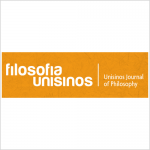Russell and Strawson on definite descriptions: The principle of charity and its role in the appraisal of a philosophical theory
Vol 14, No 3 (2013) • Filosofia Unisinos - Unisinos Journal of Philosophy
Autor: John Ian Kagayutan Boongaling
Resumo:
The principle of charity is an important norm which governs not only philosophical inquiry but also conversations (or talk exchanges). It requires that we adopt the more/most plausible or reasonable interpretation of other people’s views in such a way that we ascribe to them the greatest possible consistency and rationality. This paper highlights the importance of the principle of charity in the critical appraisal of a philosophical theory. To further this end, the paper delves into the arguments presented by Strawson against Russell’s theory of definite descriptions. In general, Strawson’s arguments are not enough to demolish Russell’s theory of definite descriptions and the main reason for this is the former’s failure to adopt the more/most charitable interpretation of the latter’s theory. This paper also argues that the crucial element which Strawson should have considered in evaluating Russell’s theory so as to comply with the demands of the principle of charity is the latter’s epistemological concern (or project), since this is its proper context.
ISSN: ISSN: 1984-8234
Texto Completo: http://revistas.unisinos.br/index.php/filosofia/article/view/fsu.2013.143.02
Palavras-Chave: definite descriptions,principle of charity,St

Filosofia Unisinos - Unisinos Journal of Philosophy
The journal Filosofia Unisinos - Unisinos Journal of Philosophy is published once every four months by Universidade do Vale do Rio dos Sinos.
Articles must be original, unpublished, and not under consideration for publication anywhere else and can be written in Portuguese, English or Spanish
Filosofia Unisinos - Unisinos Journal of Philosophy prints articles, translations and critical book reviews. It also reprints papers that are considered fundamental to the area when authorized written permission is given by the original publisher.
